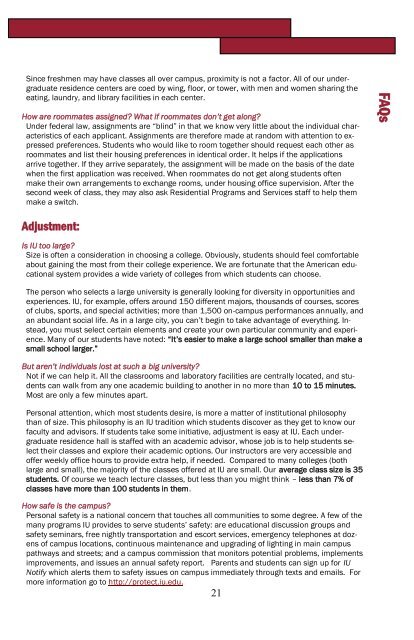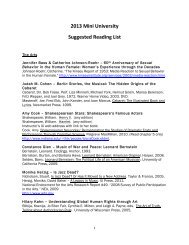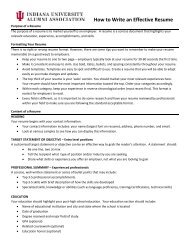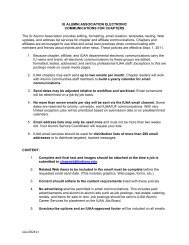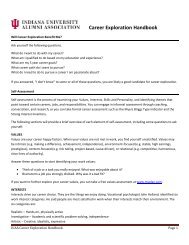It's their turn to experience tradition... - Indiana University Alumni ...
It's their turn to experience tradition... - Indiana University Alumni ...
It's their turn to experience tradition... - Indiana University Alumni ...
Create successful ePaper yourself
Turn your PDF publications into a flip-book with our unique Google optimized e-Paper software.
FAQs<br />
Since freshmen may have classes all over campus, proximity is not a fac<strong>to</strong>r. All of our undergraduate<br />
residence centers are coed by wing, floor, or <strong>to</strong>wer, with men and women sharing the<br />
eating, laundry, and library facilities in each center.<br />
How are roommates assigned? What if roommates don’t get along?<br />
Under federal law, assignments are ―blind‖ in that we know very little about the individual characteristics<br />
of each applicant. Assignments are therefore made at random with attention <strong>to</strong> expressed<br />
preferences. Students who would like <strong>to</strong> room <strong>to</strong>gether should request each other as<br />
roommates and list <strong>their</strong> housing preferences in identical order. It helps if the applications<br />
arrive <strong>to</strong>gether. If they arrive separately, the assignment will be made on the basis of the date<br />
when the first application was received. When roommates do not get along students often<br />
make <strong>their</strong> own arrangements <strong>to</strong> exchange rooms, under housing office supervision. After the<br />
second week of class, they may also ask Residential Programs and Services staff <strong>to</strong> help them<br />
make a switch.<br />
Adjustment:<br />
Is IU <strong>to</strong>o large?<br />
Size is often a consideration in choosing a college. Obviously, students should feel comfortable<br />
about gaining the most from <strong>their</strong> college <strong>experience</strong>. We are fortunate that the American educational<br />
system provides a wide variety of colleges from which students can choose.<br />
The person who selects a large university is generally looking for diversity in opportunities and<br />
<strong>experience</strong>s. IU, for example, offers around 150 different majors, thousands of courses, scores<br />
of clubs, sports, and special activities; more than 1,500 on-campus performances annually, and<br />
an abundant social life. As in a large city, you can’t begin <strong>to</strong> take advantage of everything. Instead,<br />
you must select certain elements and create your own particular community and <strong>experience</strong>.<br />
Many of our students have noted: ―It’s easier <strong>to</strong> make a large school smaller than make a<br />
small school larger.‖<br />
But aren’t individuals lost at such a big university?<br />
Not if we can help it. All the classrooms and labora<strong>to</strong>ry facilities are centrally located, and students<br />
can walk from any one academic building <strong>to</strong> another in no more than 10 <strong>to</strong> 15 minutes.<br />
Most are only a few minutes apart.<br />
Personal attention, which most students desire, is more a matter of institutional philosophy<br />
than of size. This philosophy is an IU <strong>tradition</strong> which students discover as they get <strong>to</strong> know our<br />
faculty and advisors. If students take some initiative, adjustment is easy at IU. Each undergraduate<br />
residence hall is staffed with an academic advisor, whose job is <strong>to</strong> help students select<br />
<strong>their</strong> classes and explore <strong>their</strong> academic options. Our instruc<strong>to</strong>rs are very accessible and<br />
offer weekly office hours <strong>to</strong> provide extra help, if needed. Compared <strong>to</strong> many colleges (both<br />
large and small), the majority of the classes offered at IU are small. Our average class size is 35<br />
students. Of course we teach lecture classes, but less than you might think – less than 7% of<br />
classes have more than 100 students in them.<br />
How safe is the campus?<br />
Personal safety is a national concern that <strong>to</strong>uches all communities <strong>to</strong> some degree. A few of the<br />
many programs IU provides <strong>to</strong> serve students’ safety: are educational discussion groups and<br />
safety seminars, free nightly transportation and escort services, emergency telephones at dozens<br />
of campus locations, continuous maintenance and upgrading of lighting in main campus<br />
pathways and streets; and a campus commission that moni<strong>to</strong>rs potential problems, implements<br />
improvements, and issues an annual safety report. Parents and students can sign up for IU<br />
Notify which alerts them <strong>to</strong> safety issues on campus immediately through texts and emails. For<br />
more information go <strong>to</strong> http://protect.iu.edu.<br />
21


